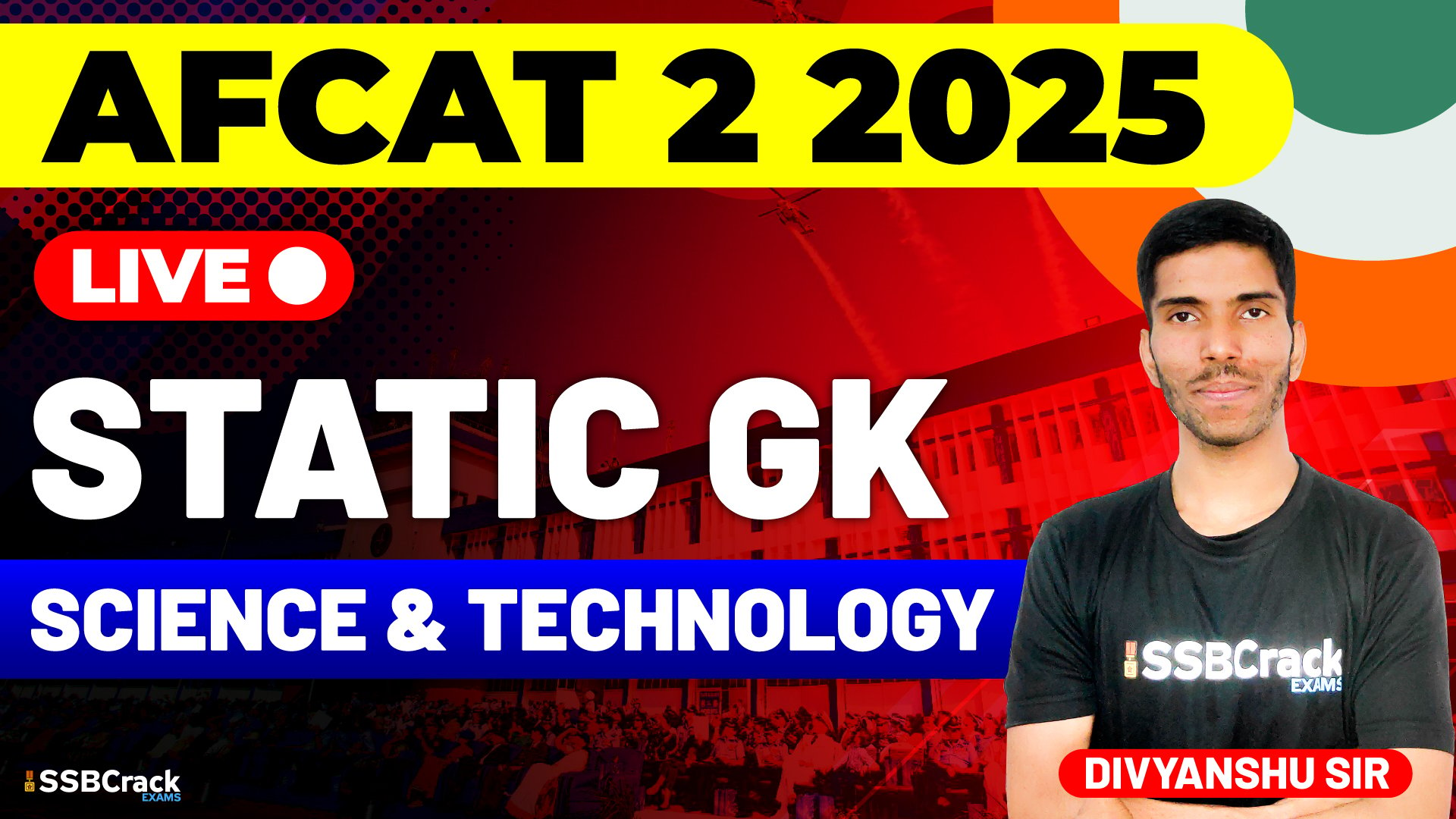Static General Knowledge (GK) is an essential part of the AFCAT (Air Force Common Admission Test) examination. Among various topics, Science and Technology is one of the most crucial sections. It not only tests your foundational knowledge but also your understanding of scientific developments and technological progress.
AFCAT 2 2025 Exam Static GK- Science & Technology
1. Branches of Science
| Branch | Study of |
|---|---|
| Physics | Matter, energy, and the laws of motion |
| Chemistry | Composition and properties of substances |
| Biology | Living organisms |
| Astronomy | Celestial objects and the universe |
| Geology | Earth’s structure, rocks, and minerals |
| Meteorology | Weather and atmospheric conditions |
| Genetics | Heredity and variation in organisms |
| Ecology | Relationships between organisms and their environment |
| Botany | Study of plants |
| Zoology | Study of animals |
2. Important Scientific Instruments
| Instrument | Used to Measure |
|---|---|
| Barometer | Atmospheric pressure |
| Thermometer | Temperature |
| Hygrometer | Humidity |
| Anemometer | Wind speed |
| Seismograph | Earthquakes |
| Spectrometer | Properties of light |
| Sphygmomanometer | Blood pressure |
| Galvanometer | Electric current |
| Ammeter | Strength of electric current |
| Manometer | Pressure of gases and vapors |
3. Famous Scientists and Their Contributions
| Scientist | Contribution |
|---|---|
| Isaac Newton | Laws of Motion, Law of Gravitation |
| Albert Einstein | Theory of Relativity |
| Galileo Galilei | Telescope, Heliocentric theory support |
| Marie Curie | Radioactivity, Discovery of Radium |
| Charles Darwin | Theory of Evolution |
| Alexander Fleming | Discovery of Penicillin |
| C.V. Raman | Raman Effect (Scattering of light) |
| Homi Bhabha | Father of Indian Nuclear Program |
| A.P.J. Abdul Kalam | Missile Development in India |
4. Important Scientific Laws & Theories
| Law/Theory | Description |
|---|---|
| Newton’s Laws | Laws of motion and inertia |
| Law of Gravitation | Attraction between two bodies |
| Ohm’s Law | Relationship between voltage, current, resistance |
| Archimedes Principle | Buoyancy of floating bodies |
| Bernoulli’s Principle | Behavior of fluid flow |
| Doppler Effect | Change in frequency due to motion |
| Theory of Relativity | Relationship between space and time |
5. SI Units of Measurement
| Quantity | SI Unit |
|---|---|
| Length | Metre (m) |
| Mass | Kilogram (kg) |
| Time | Second (s) |
| Electric Current | Ampere (A) |
| Temperature | Kelvin (K) |
| Luminous Intensity | Candela (cd) |
| Amount of Substance | Mole (mol) |
6. Inventions and Inventors
| Invention | Inventor |
|---|---|
| Light Bulb | Thomas Edison |
| Telephone | Alexander Graham Bell |
| Airplane | Wright Brothers |
| Television | John Logie Baird |
| Internet | Vint Cerf, Tim Berners-Lee (Web) |
| Computer | Charles Babbage |
| Radio | Guglielmo Marconi |
| X-Ray | Wilhelm Roentgen |
| Vaccine | Edward Jenner |
7. Important Space Agencies
| Agency | Country |
|---|---|
| ISRO | India |
| NASA | United States |
| ESA | Europe |
| JAXA | Japan |
| CNSA | China |
| Roscosmos | Russia |
8. Indian Achievements in Science & Technology
- ISRO Missions: Chandrayaan-3, Aditya-L1, Gaganyaan (upcoming)
- DRDO Innovations: Agni, BrahMos, Tejas, Astra Missiles
- Nuclear Power: First Nuclear Test – Pokhran I (1974)
- Supercomputers: PARAM series developed by C-DAC
- Digital India: Aimed at transforming India into a digitally empowered society
- Biotechnology: Development of vaccines (Covaxin by Bharat Biotech)
9. Notable Indian Scientific Institutions
| Institution | Field |
|---|---|
| ISRO | Space Research |
| DRDO | Defence Research |
| BARC | Atomic Research |
| CSIR | Scientific and Industrial Research |
| ICMR | Medical Research |
| IISc | Higher Education & Research |
| IITs | Engineering & Technology |
10. Important Satellites and Missions by ISRO
| Satellite/Mission | Purpose |
|---|---|
| Chandrayaan-1 | Moon exploration |
| Chandrayaan-3 | Soft landing on Moon |
| Mangalyaan (MOM) | Mars Orbiter Mission |
| Aditya-L1 | Solar observation |
| RISAT | Radar Imaging Satellite |
| GSAT | Communication satellites |
| Cartosat | Earth observation and mapping |
Tips to Prepare Science & Tech for AFCAT 2 2025
- Revise NCERT Science (Class 6 to 10) – Basics are often tested.
- Stay Updated – Follow recent ISRO, DRDO, and global tech developments.
- Make Notes – Especially for inventions, laws, and scientists.
- Practice MCQs – Solve previous years’ questions and mock tests.
Conclusion
The Science and Technology section in AFCAT 2 2025 Static GK is both scoring and interesting if prepared with a smart strategy. Focus on key facts, revision tables, and current advancements in Indian and global science sectors.
Stay curious and consistent in your preparation!








